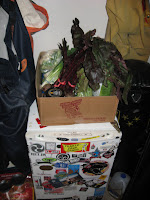 I know going to the store super early may present some storage problems but if you're not at a latitude below 38 degrees you should be able to keep a lot of things unrefrigerated for a few days in your garage or basement. Be sure that you don't have a pest problem first though because nothing destroys a Thanksgiving meal quite like rats.
I know going to the store super early may present some storage problems but if you're not at a latitude below 38 degrees you should be able to keep a lot of things unrefrigerated for a few days in your garage or basement. Be sure that you don't have a pest problem first though because nothing destroys a Thanksgiving meal quite like rats.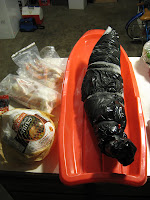 Next thing you're going to want to do is start thawing out your meats. Thawing should be done slowly so I recommend pulling that bird out of the freezer and setting it up somewhere in the garage for a day. If it's being stubborn after that, or if you're like me and freak out about things not being ready when you are then you can bring it into the house to thaw on Wednesday.
Next thing you're going to want to do is start thawing out your meats. Thawing should be done slowly so I recommend pulling that bird out of the freezer and setting it up somewhere in the garage for a day. If it's being stubborn after that, or if you're like me and freak out about things not being ready when you are then you can bring it into the house to thaw on Wednesday.Funny story about the fish. While my wife was bleeding this one, she shoves her hand down their throats and rips out the gill plate, it came back to life and latched on to her wrist ripping her glove and puncturing the skin. Naturally she screamed and half jokingly started yelling "It's got me, it's got me!" This in turn spooked the skipper and caused him to throw the boat in reverse and run clean over their own net. With a shackle and a half of gear still in the water and no way to get the line out of the prop they had to round-haul the rest of the net. It was choppy that day and they were over a mud flat or sand bar or some damn thing and the whole works started twisting up like a great big cork, line, mesh and fish sausage. Justified or not the entire fiasco and ensuing misery of disentangling the giant pile of shit, not to mention having to go dry in order to cut the line out of the wheel was blamed on my wife and her altercation with this King. Call it revenge, call it just desserts but we are going to eat that son of a bitch this Thanksgiving.
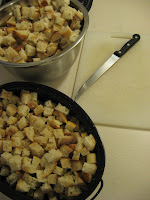 So far this is about as far as I've gotten on my preparations. Apart from organizing the menu and cutting bread cubes for the stuffing several days ago I've also made a short list of things to get done today and tomorrow, checking each of them off my master list as I go. I've actually moved the crab upstairs so that it'll thaw by tonight and I can pick it this evening. I'm also planning to make a couple of my hors doeuvres today, stuffed mushrooms and stuffed cherry tomatoes. I'll roast some garlic and make a cayenne aioli for the oyster shooters, and I'll cure some jello for our Cowboy and Indian jello center pieces, and I'll make dinner for six. Unfortunately I'm not going to have time to blog this in real time but I'm planning a retrospective for after the holiday.
So far this is about as far as I've gotten on my preparations. Apart from organizing the menu and cutting bread cubes for the stuffing several days ago I've also made a short list of things to get done today and tomorrow, checking each of them off my master list as I go. I've actually moved the crab upstairs so that it'll thaw by tonight and I can pick it this evening. I'm also planning to make a couple of my hors doeuvres today, stuffed mushrooms and stuffed cherry tomatoes. I'll roast some garlic and make a cayenne aioli for the oyster shooters, and I'll cure some jello for our Cowboy and Indian jello center pieces, and I'll make dinner for six. Unfortunately I'm not going to have time to blog this in real time but I'm planning a retrospective for after the holiday. 
 To mix the dough you don't need one of these fancy pastry cutters but can use two butter knives or a fork. T
To mix the dough you don't need one of these fancy pastry cutters but can use two butter knives or a fork. T he rolling pin is kind of essential but the scraper you can do without (it's more for clean up than anything). The spatula is totally unnecessary, in fact I don't even know why it's there, I put it away without even even using it.
he rolling pin is kind of essential but the scraper you can do without (it's more for clean up than anything). The spatula is totally unnecessary, in fact I don't even know why it's there, I put it away without even even using it.In a large mixing bowl place shortening, flour and salt. Cut together with knives, fork or whatever. When it gets sort of crumbly start adding the water. Continue cutting until about the
 fourth tablespoon of water. Once you've reached this point you can just use your hand. It may be a little sticky so put you hand in flour before you begin. Kneed until consistent but not smooth. Separate dough into desired number of pieces.
fourth tablespoon of water. Once you've reached this point you can just use your hand. It may be a little sticky so put you hand in flour before you begin. Kneed until consistent but not smooth. Separate dough into desired number of pieces. Taking each section separately ball them up in your hand until fairly smooth. The dough shouldn't be sticking to your hands when you're through so if it is put more flour on you hands and work it a little more. I don't recommend trying to back peddle by adding more flour and mixing it up again. This doesn't seem to work and things just tend to get more fucked up. Just try to deal with the dough the way it is. Use more flour on the counter or on you board, keep flouring your rolling pin and hands.
Taking each section separately ball them up in your hand until fairly smooth. The dough shouldn't be sticking to your hands when you're through so if it is put more flour on you hands and work it a little more. I don't recommend trying to back peddle by adding more flour and mixing it up again. This doesn't seem to work and things just tend to get more fucked up. Just try to deal with the dough the way it is. Use more flour on the counter or on you board, keep flouring your rolling pin and hands. Take the balls and flatten them on a well floured surface. You can do some shaping with your hands at this point but don't get carried away that's what the rolling pin is for. Roll the dough out flat making smooth and even motions from the center out toward the edges. Pause occasionally to re-flour your pin.
Take the balls and flatten them on a well floured surface. You can do some shaping with your hands at this point but don't get carried away that's what the rolling pin is for. Roll the dough out flat making smooth and even motions from the center out toward the edges. Pause occasionally to re-flour your pin.  If it sticks to the rolling pin in mid-stroke you'll end up with a tear and you don't want that. Once you've got the desired shape, check against the size of the pie plate, flour the flattened dough evenly and begin to roll it up. It took me a while to learn this trick. I used to try and lift the whole
If it sticks to the rolling pin in mid-stroke you'll end up with a tear and you don't want that. Once you've got the desired shape, check against the size of the pie plate, flour the flattened dough evenly and begin to roll it up. It took me a while to learn this trick. I used to try and lift the whole  thing off the surface and place it on the tin. Usually you'd end up with a torn pastry. This is much easier and less of a headache.
thing off the surface and place it on the tin. Usually you'd end up with a torn pastry. This is much easier and less of a headache.Once it's rolled up just lift it up, place it on the edge of the pie plate and roll it into place. Total Baby Shit (in other words, a piece of cake).
For the pie filling you can do just about anything. Personally for pumpkin pies I like to use the canned stuff and the recipe on the side. I've found that rendering your own pumpkins down to pies isn't all that it's cracked up to be. It's time consuming and to me just doesn't taste right. Maybe it's how I was raised. My Mom, her Mom, and probably her Mom's Mom have all used Libby brand canned pumpkin. Even the recipes they've handed down from generation to generation are just the ones off the side of the can. Is it brand loyalty, or is it just good shit, I don't know. Whatever it is you gotta go with what you're comfortable with. That's what Thanksgiving is all about, comfort food.

 The blackberry pie was a little different. We actually picked these back in late August and stuck them in the freezer. That's kind of another tradition. I've been picking blackberries for as long as I can remember so it would be anathema to me to use some store bought brand. It sounds like a contradiction, but again, that's just how i was raised.
The blackberry pie was a little different. We actually picked these back in late August and stuck them in the freezer. That's kind of another tradition. I've been picking blackberries for as long as I can remember so it would be anathema to me to use some store bought brand. It sounds like a contradiction, but again, that's just how i was raised. After thawing the berries I drained them in a sieve. There is a lot of juice and the berries are pretty soggy so you might want to hold back a couple cups frozen to put on the bottom o
After thawing the berries I drained them in a sieve. There is a lot of juice and the berries are pretty soggy so you might want to hold back a couple cups frozen to put on the bottom o f the shell. This helps absorb some of the shock of having all those wet berries soaking through the bottom of the pastry. I also put a generous amount of tapioca on the bottom of the shell to suck up the juice that comes out during baking. You can skip this step if tapioca grosses you out, but you're pie shell won't likely be as crispy when you're done cooking it. Along with the tapioca I put in some sugar. These are late berries so you shouldn't need too much. Earlier berries are tarter so you might want to up the sugar but it's all up to your personal taste. Once I've got the base down I put in the berries, sprinkle on a little more tapioca and sugar and then close up the pie. Use your thumb and forefinger to pinch together the edges. Take a fork and poke some holes in the top crust so steam can escape during baking. Wrap in cellophane and store in freezer. I'll be taking my blackberry pie out to thaw tomorrow. It doesn't have to be entirely thawed before baking but it helps to be close. The pumpkin pies I'll be baking tomorrow night. The blackberry probably the day of after the turkey comes out of the oven.
f the shell. This helps absorb some of the shock of having all those wet berries soaking through the bottom of the pastry. I also put a generous amount of tapioca on the bottom of the shell to suck up the juice that comes out during baking. You can skip this step if tapioca grosses you out, but you're pie shell won't likely be as crispy when you're done cooking it. Along with the tapioca I put in some sugar. These are late berries so you shouldn't need too much. Earlier berries are tarter so you might want to up the sugar but it's all up to your personal taste. Once I've got the base down I put in the berries, sprinkle on a little more tapioca and sugar and then close up the pie. Use your thumb and forefinger to pinch together the edges. Take a fork and poke some holes in the top crust so steam can escape during baking. Wrap in cellophane and store in freezer. I'll be taking my blackberry pie out to thaw tomorrow. It doesn't have to be entirely thawed before baking but it helps to be close. The pumpkin pies I'll be baking tomorrow night. The blackberry probably the day of after the turkey comes out of the oven.
All right, that's all I got. Now I gotta get to work. Have a happy Thanksgiving. Always remember the seven P's, Proper Preparation Prevents Piss Poor Performance.
I know what you're thinking but nobody ever said that fishermen were math wizards.


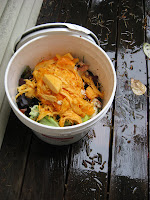







 2. Using some rudimentary carving tools left over from the days when I was an art student I went to work on the hull and carved my design in full relief. This took some time and a lot of patience but luckily I had plenty of beer and loud music to keep me going. For starters I traced all the lines with a flat blade. Then I took the skinnier of the two lathes and went around all the designs. Once that was done I took the thicker one and shaved off all the excess skin.
2. Using some rudimentary carving tools left over from the days when I was an art student I went to work on the hull and carved my design in full relief. This took some time and a lot of patience but luckily I had plenty of beer and loud music to keep me going. For starters I traced all the lines with a flat blade. Then I took the skinnier of the two lathes and went around all the designs. Once that was done I took the thicker one and shaved off all the excess skin.
 But I thought, what with the city ordinances and the possible damage to the deck, that it would be better just to drop it onto the pavement below. Maybe next year I'll take my pumpkin out into the woods and retire it properly.
But I thought, what with the city ordinances and the possible damage to the deck, that it would be better just to drop it onto the pavement below. Maybe next year I'll take my pumpkin out into the woods and retire it properly.




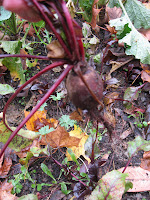


 Don't be alarmed. I'm not talking about a horde of angry Cossacks here. Or a group of Communist hardliners. I'm talking about a different kind of Red invasion altogether. One that has been steadily increasing year after year for the better part of this decade. I'm talking about Russian Red King Crab. It's everywhere we look. At the Fred Meyer, in Wal-Mart, in the fish department at Safeway. It's nearly impossible to find Alaskan caught King Crab in stores these days. Sure you can ask around but supermarkets and groceries aren't obliged to tell us where their crab is coming from. They may all proudly label their selections Wild, as this is the watch word of the day in sustainable seafood, but Wild in this case guarantees nothing. Who caught this crab? Was it within their quota or in excess? Is the crab of legal size? All questions that can not be answered, or will not be answered at the point of sale.
Don't be alarmed. I'm not talking about a horde of angry Cossacks here. Or a group of Communist hardliners. I'm talking about a different kind of Red invasion altogether. One that has been steadily increasing year after year for the better part of this decade. I'm talking about Russian Red King Crab. It's everywhere we look. At the Fred Meyer, in Wal-Mart, in the fish department at Safeway. It's nearly impossible to find Alaskan caught King Crab in stores these days. Sure you can ask around but supermarkets and groceries aren't obliged to tell us where their crab is coming from. They may all proudly label their selections Wild, as this is the watch word of the day in sustainable seafood, but Wild in this case guarantees nothing. Who caught this crab? Was it within their quota or in excess? Is the crab of legal size? All questions that can not be answered, or will not be answered at the point of sale. 
